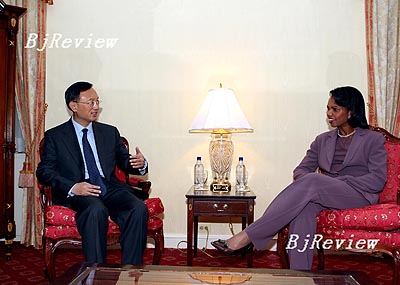|

The General Committee of the 62nd Session of the UN General Assembly decided on September 19 not to include the so-called issue of "Taiwan's participation in the UN," raised by Solomon Islands and a few other countries, in the agenda of this year's General Assembly. The General Assembly has thwarted proposals related to Taiwan 15 consecutive times since 1993. The Taiwanese authorities' attempts to change the status quo - where the Chinese mainland and Taiwan belong to one China - by taking advantage of the UN ended in failure.
Futile attempts
Taiwanese authorities have backed motions on "the Republic of China's reentry" into the UN every year since 1993. These motions have been vetoed, without exception, by the General Committee. This year, however, they prompted some countries with which Taiwan has "diplomatic relations" to table the first ever proposal on the island's participation in the UN under the name of Taiwan. They also played up the issue across the Taiwan Island and elsewhere in the world, with unprecedented financial and human resource input.
Taiwanese leader Chen Shui-bian wrote two letters to the UN secretary general, one to the president of the Security Council and one to the president of the General Assembly, all of which were returned. Chen frequently gave exclusive interviews to international media outlets. The Taiwanese authorities clamored for their UN campaign in foreign countries with paid advertisements. The ruling Democratic Progressive Party (DPP) staged a large parade in support of the referendum.
Despite all the hype, the Taiwan-backed proposal was rejected at the UN. The world body made the decision in light of the basic principles of the UN Charter, the international political situation and the Chinese people's firm determination to oppose "Taiwan independence."
The proposal runs counter to the purposes and principles of the UN Charter. Being part of China, Taiwan is not qualified to join the UN, an international organization that requires statehood. UN General Assembly Resolution 2758 adopted in 1971 expelled representatives of the Taiwanese authorities from the UN, thereby resolving the issue of China's representation in the UN. Consequently, there should be no such issue as Taiwan's representation in the UN. The proposal, therefore, is essentially an attempt to seek independence for Taiwan, alter the status quo across the Taiwan Straits, challenge the General Assembly resolution and violate the UN Charter. It is bound to meet with opposition from the overwhelming majority of the countries. UN Secretary General Ban Ki-moon clearly stated that it violated the one-China principle enshrined in the General Assembly Resolution 2758. It is "not legally possible" to receive the Taiwan's application for UN membership, he said.
If it had been adopted, the proposal would have jeopardized many countries' interests in China. China is known as the "world's factory" and the "world's market." Peace and stability across the Taiwan Straits, which create favorable conditions for other countries to strengthen their cooperation with China and allow their economies to prosper, serve the strategic interests of all countries, especially major Western powers.
Most importantly, Taiwan's attempt to join the UN is doomed because of China's growing national power and rising international standing. The adoption of General Assembly Resolution 2758 itself resulted from the contrast in power across the Taiwan Straits. To date, more than 160 countries have established diplomatic relations with China. All these countries uphold the one-China policy and recognize that the People's Republic of China is the sole legitimate government of China and that Taiwan is part of China. In particular, since China adopted the Anti-Secession Law in 2005, Western countries have come to realize the danger of the hard-line "Taiwan independence" policy. They all announced that they did not support the proposal on Taiwan's participation in the UN.
Complex developments
While pushing for Taiwan's membership in the UN, the Taiwanese authorities are going all out to set the stage for the referendum on Taiwan's UN bid. Chen has said that these moves are meant to pursue "democracy," "human rights" and "international living space for Taiwan" and "let the people in Taiwan determine the future of Taiwan." In fact, his deceptive rhetoric hides ulterior political motives.
First of all, the moves can help Chen dominate the pan-green coalition, an informal political alliance in Taiwan that favors "Taiwan independence." Chen hungers for political power and is unwilling to exit the political stage after stepping down. Moreover, he is afraid of being held responsible for his many scandals. That's why he is trying to foster an image of an anti-American hero and hero of "Taiwan independence" and extend his political influence by manipulating the DPP's election programs for legislators and the "president." In this way, he will be able to gain the support of pro-independence fundamentalists as the leader of the pan-green coalition, thus sustaining his influence on Taiwan's politics.
Secondly, the moves can give the DPP an upper hand in the "presidential elections" next year. The DPP has always canvassed votes with its Taiwanese identity. Now that its image has been severely harmed by its political incompetence and bribery scandals, Chen has to divert the public's attention by trumpeting "Taiwan independence" topics such as the referendum on Taiwan's UN bid. Chen's initiatives have forced the opposition pan-blue coalition to follow suit with a proposed referendum on Taiwan's "reentry" into the UN. The pan-blue coalition tends to prefer a Chinese nationalist identity over a Taiwanese separatist one and favors greater economic linkage with the mainland. It may lose the support of most middle-of-the-road voters if it fails to make the most of these policies.
| 